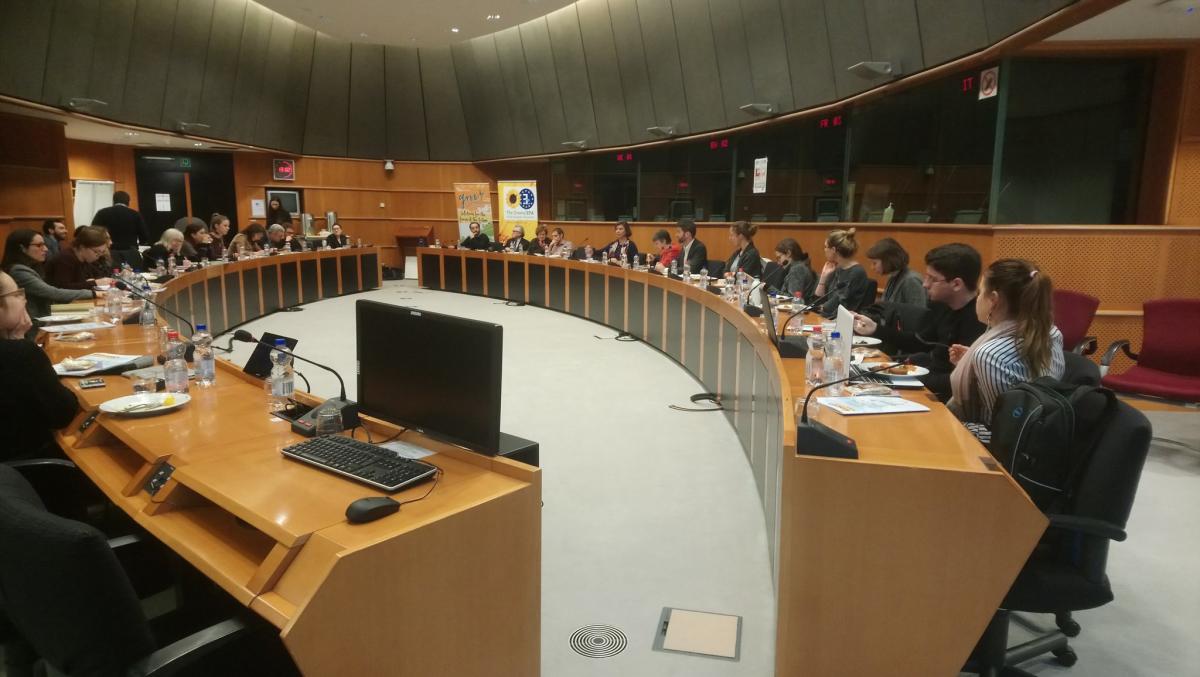Campaigns and Policy Officer Tom Kuehnel recently visited European Parliament in Brussels, where the findings of The Vegan Society's Grow Green report were presented to key EU decision makers
Last week saw the presentation of our Grow Green report, written by the New Economics Foundation, to European parliamentarians, policy-makers, and NGOs. The event was co-hosted by Green Party MEPs Molly Scott Cato and Keith Taylor, and took place in Brussels’ European Parliament. It was an exciting first for The Vegan Society in getting our work in front of EU decision makers.
The event was well attended and engagement levels were high amongst attendees. The fact that this topic sparks interest across the EU is a reassuring sign that our findings and recommendations have wide-reaching relevance. Attendees included representatives from NGOs like Friends of the Earth Europe and Compassion in World Farming, and farming groups like La Via Campesina were also present. Importantly, politicians and their teams from various member states were well represented, including MEPs from Spain, the Netherlands and Germany.
Event participants were welcomed with a delicious pulse-based vegan lunch, helping to showcase the impressive versatility of protein crops and to give them an idea of the possible end-uses. The British pulse pioneers and Vegan Trademark holders, Hodmedod’s, also provided packs of their split fava beans for delegates to take away and enjoy. Hodmedod’s won Best Food Producer in the 2017 BBC Food and Farming Awards, a clear indication that there is a growing appetite for pulses amongst consumers. You can read their story and the story of other successful plant protein pioneers here.
After Keith Taylor MEP’s opening remarks, Griffin Carpenter, Senior Researcher at the New Economics Foundation and author of Grow Green: Solutions for the farm of the future, outlined the key findings and policy recommendations. Although the report focusses on how we can shake-up UK agriculture post-Brexit, the policy recommendations can easily apply to all EU member states. Possibilities include a new entry scheme to get more people into farming and a Protein Aid Scheme to help those farmers grow sustainable protein crops. Comments and questions from the floor touched on a broad range of topics - from access to training for farmers looking to transition their farms, to how we can disincentivise animal farming through taxation or the removal of subsidies, to better reflect the health and environmental costs associated with it.

The event comes at a perfect time because the EU’s Agriculture Commissioner, Phil Hogan, has recently launched a consultation into protein crops as part of their Protein Strategy with the goal of improving production in the coming years. Despite the fact that we will be leaving the EU, it was an exciting opportunity to show how we can all, our EU neighbours included, create a better agricultural system - one that prioritises protein crops grown for human consumption. You can get in touch with your MEPs to tell them why we need to shake-up agriculture and send them an electronic copy of our Grow Green report. You can find the MEPs for your region, as well as their contact details, here.
The UK Government’s Department for Environment, Food and Rural Affairs, has also launched a consultation on food and farming in the UK. It has been couched as a once-in-a-lifetime opportunity to shape the future of our food and farming policy - so we need your help in getting our report and its recommendations in front of MPs from around the country.
As Molly Scott Cato writes in a recent article, the decisions we make regarding what we farm and subsequently consume have a dramatic impact on our planet and its inhabitants. I’ll leave you with a quote made at the event from the Dutch Party for the Animals MEP, Anja Hazekamp, who stated that “Our forks and knives are our biggest weapons in protecting the environment and fighting climate change”.
Take action today to change how we eat, and how we farm for the better.
The views expressed by our bloggers are not necessarily the views of The Vegan Society.

